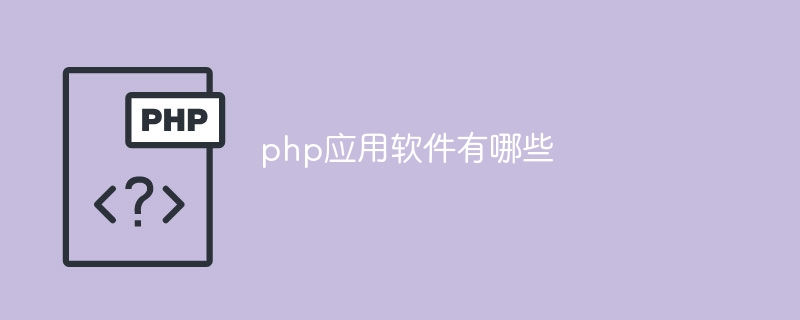Home >Backend Development >PHP Problem >What are the PHP application software?
What are the PHP application software?
- zbtOriginal
- 2023-07-21 17:30:261797browse
php application software includes: 1. WordPress, which provides a large number of themes and plug-ins for users to choose from; 2. Joomla, which provides more powerful and flexible functions; 3. Magento, which provides powerful functions and flexibility Customization options; 4. Drupal, provides a variety of modules and themes; 5. phpBB, provides rich functions and customizability; 6. Moodle, used for creation; 7. MediaWiki; 8. ownCloud; 9. Laravel; 10. CodeIgniter.

The operating environment of this tutorial: windows10 system, php8.1.3 version, DELL G3 computer.
PHP(Hypertext Preprocessor) is a very popular open source server-side scripting language commonly used to develop dynamic websites and applications. Due to its ease of learning and ease of use, PHP is widely used in projects of various sizes. The following will introduce some common PHP application software to help readers understand the wide range of application fields of PHP.
1. WordPress: As the most popular open source content management system (CMS), WordPress uses PHP as its core language. It allows users to quickly build personal blogs, corporate websites, e-commerce websites, etc., and provides a large number of themes and plug-ins for users to choose from to meet various needs.
2. Joomla: Similar to WordPress, Joomla is also a PHP open source CMS. It provides more powerful and flexible features and is suitable for creating complex websites such as corporate portals, social networks and e-commerce platforms.
3. Magento: As the most popular open source e-commerce platform, Magento is written in PHP. It offers powerful features and flexible customization options suitable for small to medium to large businesses to create an outstanding online store.
4. Drupal: Drupal is another popular open source CMS for PHP. It offers a variety of modules and themes that can be used to create various types of websites, including government websites, community portals, and news publishing websites.
5. phpBB: phpBB is an open source forum system written entirely in PHP. It offers rich functionality and customizability, enabling users to create their own online communities.
6. Moodle: Moodle is an open source online learning management system (LMS) for creating and managing online courses and training content. It uses PHP as the core language and provides various teaching tools and interactive functions to support educational institutions and enterprises in online education.
7. MediaWiki: As the basic platform of Wikipedia, MediaWiki is a powerful and easy-to-use open source wiki software. It allows users to create and edit collaborative knowledge bases and uses PHP as the core language.
8. ownCloud: ownCloud is an open source self-hosted cloud storage solution that helps users build private cloud services to store and share files. It is written in PHP and supports multiple operating systems and devices.
9. Laravel: Laravel is a popular PHP framework for rapid development of web applications. It provides an elegant code base and rich features that enable developers to build great applications more efficiently.
10. CodeIgniter: CodeIgniter is another lightweight PHP framework that is widely used for developing small to medium-sized web applications. It is fast and flexible, and provides easy-to-understand documentation, allowing developers to quickly get started and develop applications.
In summary, PHP application software is widely used in website development, content management, e-commerce, online education and communities. The above-mentioned software is only part of it. With the development of PHP, more innovative and exciting application software will continue to emerge, further promoting the development of PHP in the Internet industry. For developers, proficiency in the PHP language and related frameworks will provide them with more opportunities and challenges in this rapidly developing industry. .
The above is the detailed content of What are the PHP application software?. For more information, please follow other related articles on the PHP Chinese website!

